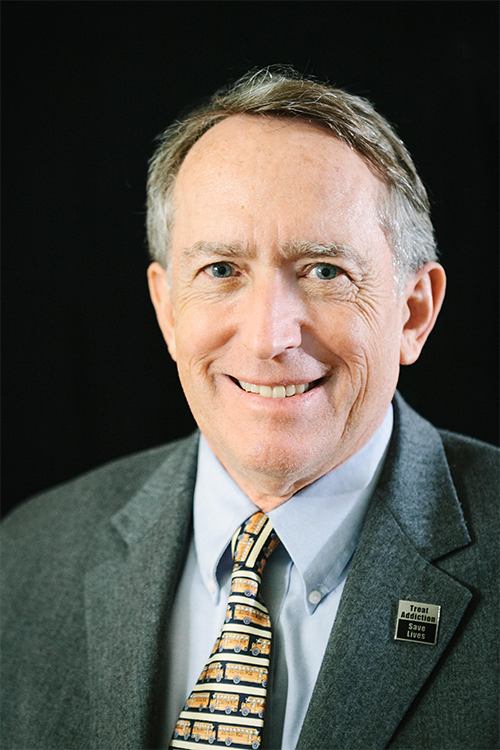Kevin Kunz: Working to prevent addiction
As a physician on the Big Island who had been treating patients since the early 1980s, Kevin Kunz, MD, MPH, was alarmed when, in the 1990s, he noticed a sharp uptick in the number of  patients suffering from substance-use disorders. As patient after patient came into his office seeking help, he began to think deeply about the biology and human behaviors underlying addiction.
patients suffering from substance-use disorders. As patient after patient came into his office seeking help, he began to think deeply about the biology and human behaviors underlying addiction.
Fortunately, Kevin had studied public health as well as medicine, graduating from UH Public Health in 1981.
Drawing on his public health background, Kevin realized the heart-breaking toll addiction was taking not only on his patients, but also on their families and communities. And although the field of medicine offered some limited options for treating patients with addiction, his public health perspective led him to see that these communities needed much stronger addiction prevention and treatment efforts.
"In medical practice, you can improve the lives of many people, but with a population health approach, you can influence larger groups and communities," Kevin says. "The successes of public health – getting clean drinking water to cities and preventing the spread of infectious diseases – have come about from efforts to improve the health of whole populations."
Kevin had spent time in low- and middle-income countries, including Vietnam where he served in the U.S. Marine Corps, and Panama, where he completed a medical internship after earning his MD from the John A. Burns School of Medicine and his MPH from UH Public Health. Counterintuitively, the people in these communities seemed to him to be healthier in many ways than Americans.
"It was clear to me that the diseases of America were largely driven by behaviors, and that meant those diseases could be preventable," Kevin says. As a physician, it was easy for him to treat diseases such as pneumonia and heart failure, but much more difficult to treat complex medical and behavioral diseases, including addiction. After his internship in Panama, Kevin enrolled in the preventive medicine residency at UH.
"Preventing drug use and early intervention for risky substance users is the key, and someone had to do something different from what we were already doing," Kevin says. "America and its communities cannot treat or incarcerate their way out of these epidemics."
He took action. Working with others, Kevin founded a group called the American Board of Addiction Medicine, which started a formal process for certifying physicians in the field. He also helped establish a foundation to develop year-long training programs to teach physicians ways to prevent and treat addiction. The foundation, now named the American College of Academic Addiction Medicine, developed a new, year-long curriculum for doctors to produce clinical experts, faculty, researchers, and system change agents. No similar programs were available at the time. More than 60 fellowships were developed, and more than 4,000 physicians completed the program between 2009 and 2016.
These efforts paid off. In 2016, the American Board of Medical Specialties recognized Addiction Medicine as its newest subspecialty. This means doctors can now enter fellowship training programs across the U.S. that are based on the original model Kevin and his group created. Rising numbers of physicians are signing up for the programs.
"I would never have done all this without my background in public health," Kevin says. "I never would have seen the world through the lens of public health."
The key to helping patients and their families is the recognition that disease is not only a biological phenomenon, and that people's behaviors are influenced by what they feel in their hearts. Information and statistics about the dangers of drug use rarely change anybody, he says. "Working in public health means paying attention to the science as well as learning how to send messages to people's hearts. That's how transformative change really happens."
Kevin's advice for people considering a career in public health is to heed the words of Johann Wolfgang von Goethe, who said, "Dream no small dreams, for they have no power to move the hearts of men." Once we've realized what people need, we can imagine and work toward solutions.
"Don't be limited by what's available right now," Kevin says. "Think big. It may take 20 years to see an idea through, but youʻll have the quiet satisifaction of a job well done."
